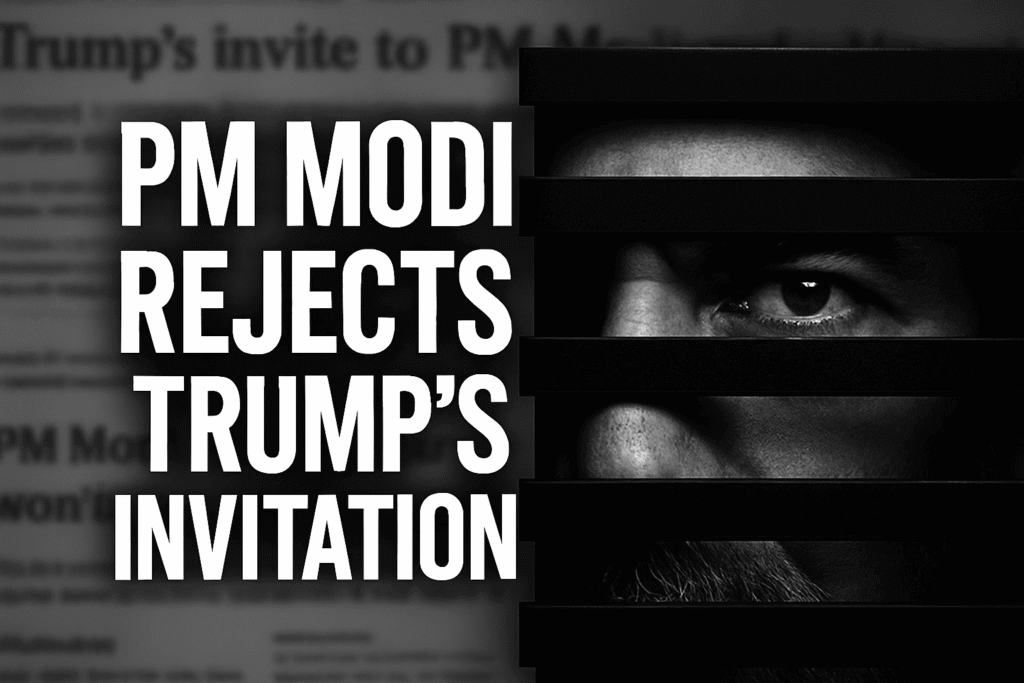PM Modi Rejects Trump’s Invitation: A Strategic and Bold Diplomatic Message from India
In a recent geopolitical development, Prime Minister Narendra Modi declined an invitation from former U.S. President Donald Trump to meet in the United States. This move, publicly confirmed by India’s Foreign Secretary Vikram Misri, has been interpreted as a strong diplomatic signal reflecting India’s evolving stance on global alliances and its foreign policy priorities.
India’s Refusal: A Calculated Diplomatic Stand
The refusal stems from a mix of strategic considerations and dissatisfaction with previous comments made by Trump. Over the past months, Trump has made a series of controversial remarks:
- Claimed personal credit for negotiating a ceasefire in South Asia
- Asserted he could resolve the “centuries-old Kashmir dispute”
- Referred to Pakistan as a key ally in combating terrorism
These statements have not been well received in India, where Trump’s perceived favoritism toward Pakistan has eroded goodwill. The Indian government’s swift and transparent response through official channels suggests a new assertiveness in Indian diplomacy.
Background of the Rejected Meeting
The invitation followed a failed attempt to meet at the G7 Summit in Canada, where Trump left early after sparring with fellow leaders. He later called PM Modi for a 35-minute conversation, inviting him to Washington D.C. Modi declined due to a prior commitment, but the message was clear: India will not be swayed by superficial diplomatic overtures.
Modi-Trump Call: Uncovering the Truth
During their phone conversation, PM Modi addressed two key misrepresentations:
- Operation Sindoor Misstatement: Trump implied he was briefed about Operation Sindoor. In reality, Modi clarified that their previous communication was limited to a post-Pulwama condolence call, and no discussions about Operation Sindoor had taken place until this call.
- Rejection of Mediation Claims: Trump also claimed to have used trade negotiations to de-escalate India-Pakistan tensions. Modi corrected the record, affirming that:
- No trade-based or diplomatic mediation occurred
- Ceasefire talks were initiated directly by Pakistan
- India has never accepted third-party mediation on Kashmir or regional security issues
This reaffirmation of India’s longstanding policy underlined its commitment to sovereignty and regional leadership.
India’s Anti-Terror Policy: A War, Not a Proxy
PM Modi gave a detailed account of India’s post-Pulwama counter-terror strategy:
- On May 6–7, India conducted precision strikes on terrorist hideouts in Pakistan and POK
- On May 9, after intelligence about a possible Pakistani offensive, India preemptively struck Pakistani positions, crippling their airbases
- Modi emphasized that India now treats terrorism as a full-scale war, not just a proxy issue
These operations under Operation Sindoor showcased India’s readiness to retaliate and set a new precedent in South Asian security policy.
Trump’s Foreign Policy Tilt Toward Pakistan
The refusal also reflects growing unease over Trump’s pro-Pakistan stance, including a planned lunch with Pakistani military leadership. Indian observers see this as a contradiction, especially given Pakistan’s designation by many as a hub of terrorism.
Trump’s approach appears transactional, possibly influenced by short-term goals in the Middle East and Iran. However, this realignment risks long-term consequences for U.S.-India relations, which had been steadily improving under previous administrations.
Global Perception and Modi’s Global Statesmanship
Modi’s dismissive response echoes growing global frustration with Trump’s erratic diplomacy. At the G7, Modi reportedly joked to French President Emmanuel Macron about Trump’s Twitter spats—a sign that world leaders are recalibrating their strategies around a changing U.S. foreign policy.
Key Takeaways for India’s Global Policy:
- India is charting an independent diplomatic course
- Terrorism is now treated as an act of war by India
- Third-party mediation on Kashmir remains unacceptable
- US-India ties must be based on mutual respect, not transactional diplomacy
India’s decision to snub Trump’s invitation is more than a scheduling conflict—it is a calculated geopolitical message affirming India’s strategic autonomy, commitment to counterterrorism, and rejection of shallow diplomacy.

